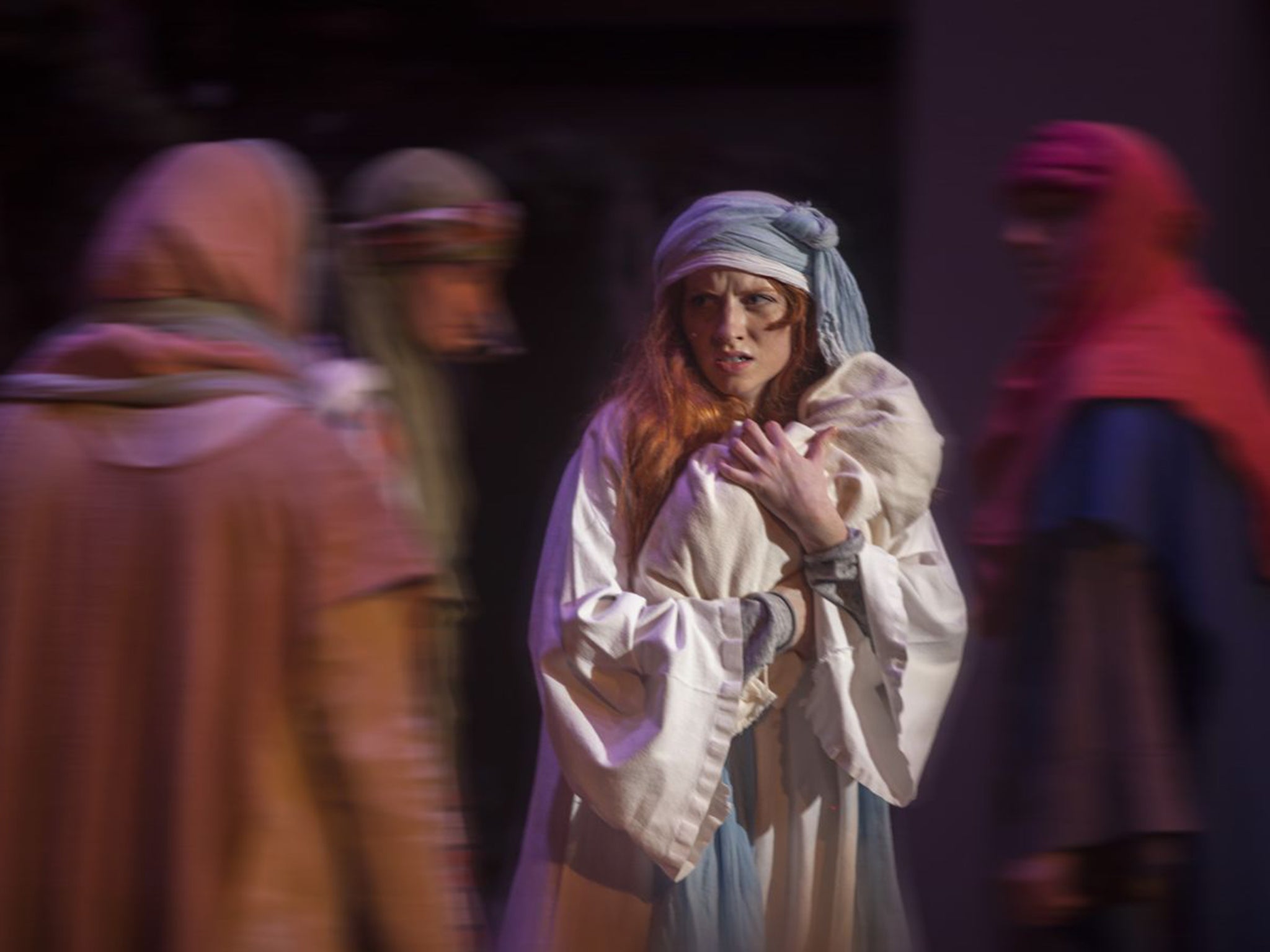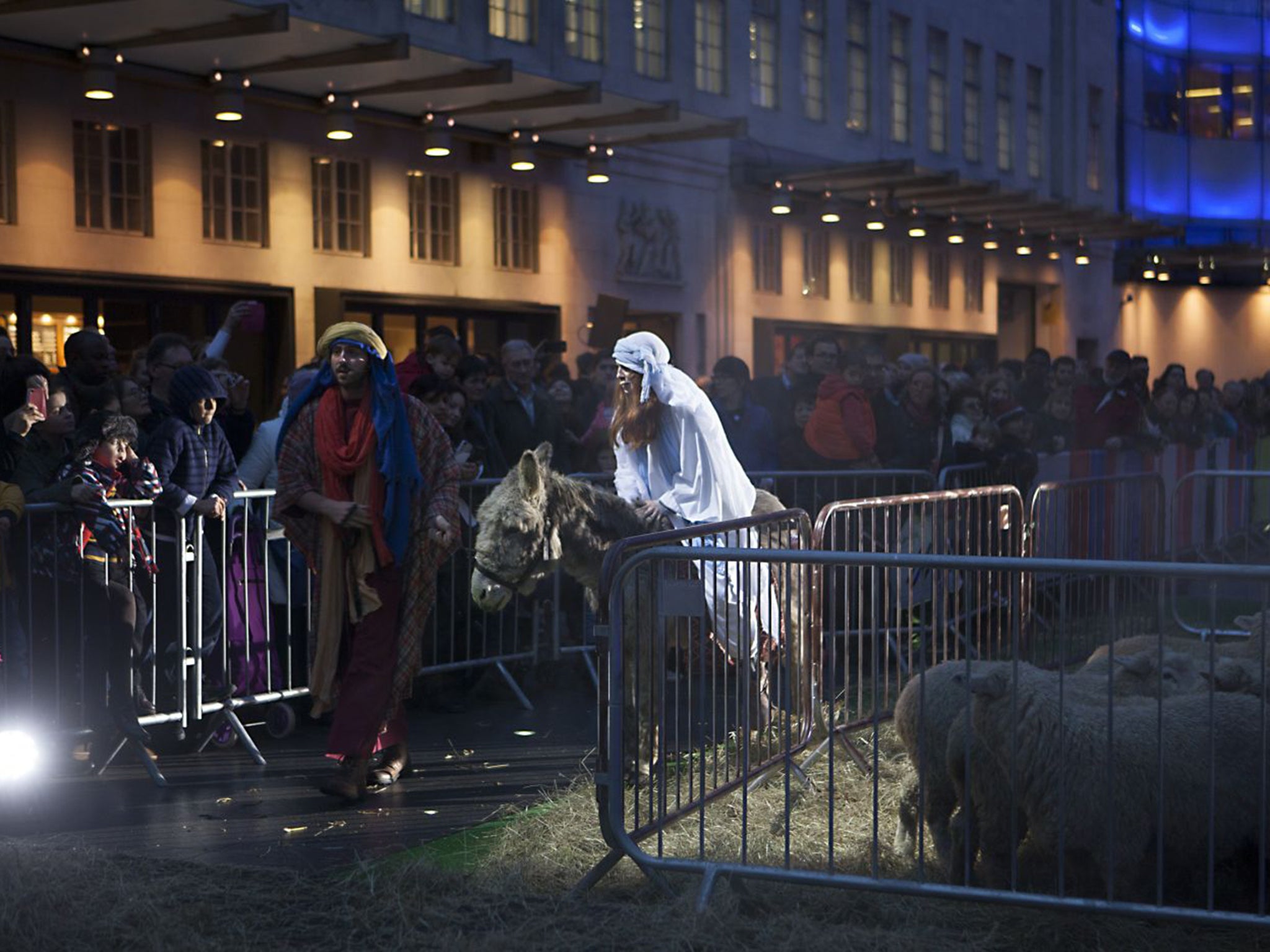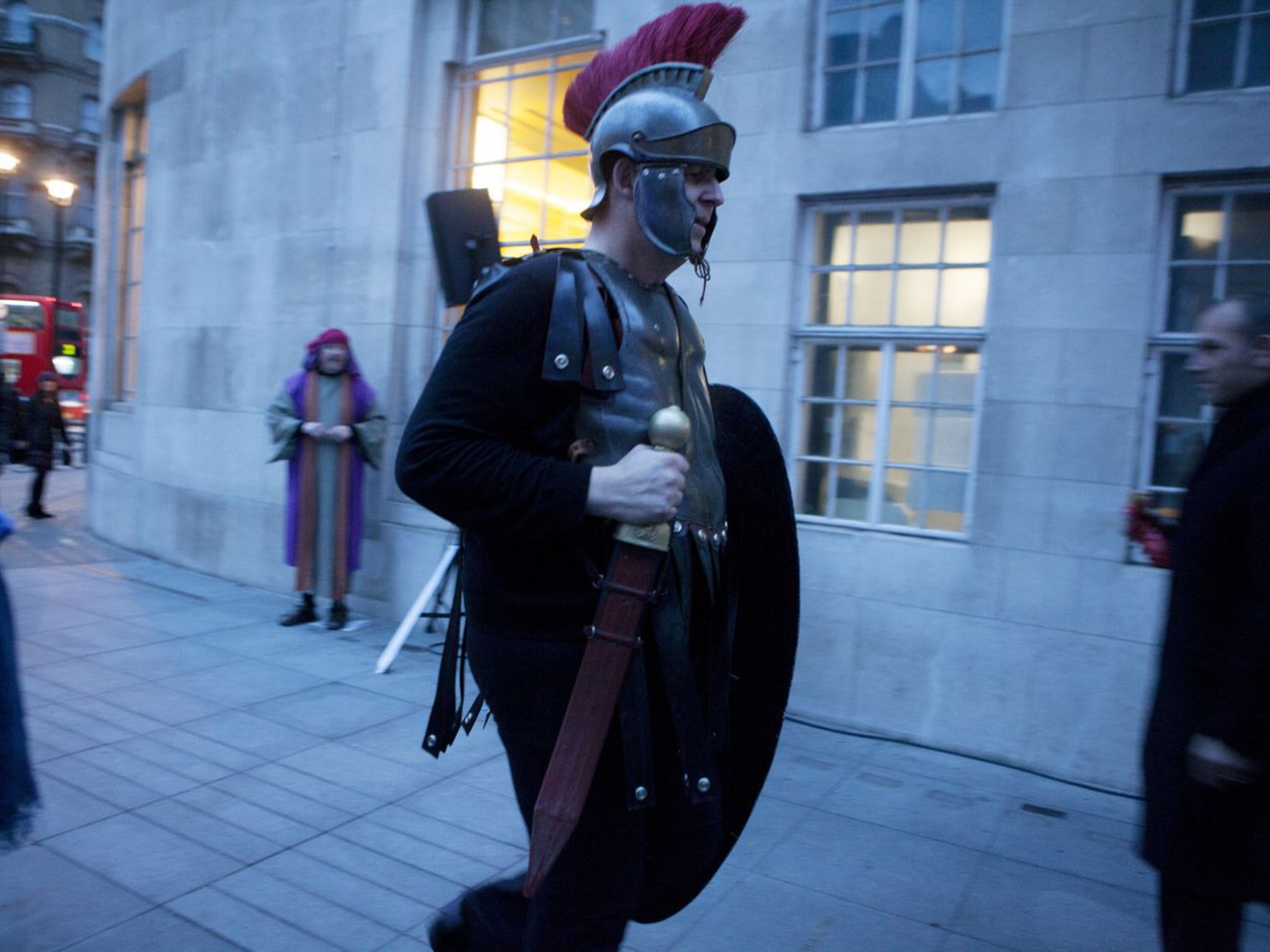The Wintershall Nativity: Born in a stable bare, just off Oxford Circus
Usually staged in Surrey, the play has decamped to London for the day, with an extra Roman soldier in the cast

There is one question no one wants to hear moments before the start of a nativity play: "Has anybody seen the infant Jesus?"
Two out of three kings will do, shepherds can busk it, even Mary can get by without Joseph, but the babe wrapped in swaddling clothes is essential. No baby, no show.
Unfortunately, here and now, the real baby meant to represent Jesus is bawling her eyes out and the silent plastic understudy has been lost.
Disaster looms, because this is not just a school play with 10 lobsters leaping but the most serious, most ambitious nativity in the country.
The Wintershall Nativity is usually performed on an estate of that name in rural Surrey, in a barn high on a hill with real flocks of sheep and a donkey called Chester. The angel Gabriel appears in the trees to shepherds warming their hands on real bonfires, before the audience of 600 people decamps to the barn. It is magical by candlelight – and with animals packed in and two of the three kings arriving on horseback, it can smell pretty authentic, too.
The last two performances take place today. Once a year, the large amateur cast gets a coach up to London to perform at All Souls, Langham Place, the church next to Broadcasting House. That's where I come in.
Sheep look startled in a pen outside the One Show studio. BBC staff and tourists look even more startled as four of us march past, dressed as Roman soldiers.
Why am I doing this? Because someone dared me. I have written a lot lately about how we are having to renegotiate Christmas, what it means and how to celebrate it without offending anyone. Nativity plays have become a focus of that, though even the most devout Christians have to admit they are a long way from what's in the Bible. I have been challenged to see the ultimate traditional nativity from the inside, regardless of personal faith.

But that doesn't feel like much of an answer as the breastplate chafes, the chill of the night gets right up my Roman skirt and a group of young people laugh. They are genuinely alarmed by my fake military snarl. And they speak Italian. Incredibly, these students really are Romans.
A passing BBC staffer shouts in Latin. Translation? "What have the Romans ever done for us?"
A young man is smiling so I demand to see his security pass. He says in a superior tone: "I suppose you are aware that a Roman soldier would customarily carry his shield with his left hand?"
I suddenly wish we were doing this somewhere else, where people are bit less clever. But I give him my best glare and say: "You, son, have had a lucky escape."
The angel Gabriel appears in the heavens – well, in a spotlight on the roof of All Souls. Her real name is Kathy Longbottom and I know she has a safety harness under those huge white feather wings, but it's a spectacular sight. So is the Star of David projected on the spire.
Then we beat a retreat to a dressing room in the basement of the church, where we discover Baby Jesus has gone Awol.
Gaye, the patient props mistress, gathers up a bundle of blankets to stand in for the Christ child until the doll is found, or the real baby shuts up. Both things happen, just in time.
For all the palaver, there is some proper acting at the heart of this play. The young couple playing Mary and Joseph are very good. The scene in which he realises he will have to divorce her because she's pregnant is a sudden, convincing burst of kitchen-sink drama.
The choir sings beautifully. And there is something unavoidably lovely about the moment when the real baby starts gurgling away and reaches out to touch the face of its surrogate mother.
You don't have to be a Christian to be in the cast, but the intentions are very clear: the Wintershall Nativity is an act of evangelism. Prayers are said before each performance.

The former archbishop of Westminster, Cardinal Cormac Murphy-O'Connor, is in the front row (which is awkward, as last time we met I asked tough questions about the church and child protection).
The creator of all this is a millionaire businesman called Peter Hutley, who wrote the script and is playing the elderly Simeon again tonight, at the age of 88. He bought the 1,000 acre Wintershall estate half a century ago, and later the big barn on the hill: "I said if I could get that, I would do something with it for God."
The first nativity was a small family affair in 1989, but it grew and grew. More than 6,000 people will see the play this Christmas. On Good Friday the Wintershall cast puts on a passion play that attracts 10,000 people to each performance in Trafalgar Square. There is also six-hour life of Christ in the summer that uses the estate's natural hills and lake for a setting.
Somebody says the Roman armour came from the film company that made Gladiator, and it feels heavy enough. Next we change into lighter gear, to play King Herod's guards. Not so much a speaking part, more of a roar – it involves raging through the church waving spears, threatening to kill all the first-born children. We're supposed to hold one up and cut his throat, but this was vetoed in rehearsal by Peter's daughter, Charlotte de Klee, who is taking over from him as producer.
Ashley Herman, one of the two directors, was livid. He has produced or co-produced 35 West End shows, calls everyone "love", or "darling", and hops up and down when angry. "It's in the script! That's what the story demands!" But Mrs de Klee is the producer, the family holds the purse strings and the throat is not going to be cut.
Ashley himself demands far more than he has the right to expect from a cast that contains just one professional actor, but many of them have been doing this for years.
The family, friends, staff and neighbours of the estate all volunteer for service. "See that chap there? He's my accountant," says Hutley of a man wrapped in colourful shepherd's robes. Some people travel long distances to be part of this, but it is still a very Surrey nativity. The cast is a largely white, largely middle class bunch, who express themselves with a typical Home Counties mixture of passive aggression, self-deprecation and silly jokes.
Like any such group they can make an outsider feel isolated – and are mortified when they find out. A full day of rehearsals in a draughty barn passes before anyone mentions there is coffee available, and a warm dressing room. My costume even gets forgotten, so I have to appear in black leggings and a top I brought myself. But their enthusiasm is also infectious.
Just before we start, the fearsome co-director gives us a pep talk: "I got told off last year by a visiting priest who said 'You shouldn't be talking to people like that in here.' I said: 'You try leading this lot.' I love you all, really."
It's mutual. Just as well, because we soldiers have to rush in fast from the wings and catch Herod as he falls backwards into Hell, as thunder claps and red lights flash.
The archangel Michael is wearing polished riding boots, a white tunic and a shiny gold breastplate, with flamboyant wings. This is all gloriously camp. It's quite unintentional. The audience must wonder why one of the guards is dressed (under the armour) as though he's going to the gym. But the theatre critic from the Guardian doesn't notice, and gives us a four-star review.
By now I am starting to care, darling. But I'm not keen on appearing in the last set-piece, a rather cheesy preach about love while the cast hold (electric) candles and sing to the baby. I don't want to spoil the look of it with my tracksuit. But Ashley notices, wraps a shepherd's scarf around me and says: "Come on, love. You're one of us now."
I'm not, quite, but it is a nice gesture. The Wintershall Nativity is deeply eccentric but oddly charming. As a spectacle, echoing the past in these changing times, it is fascinating. And all my attempts at keeping a professional distance break down at the end when we line up to let the audience out and a woman says: "Thank you for scaring us!" I growl at her little boy and have my own little epiphany. This is fun.
Join our commenting forum
Join thought-provoking conversations, follow other Independent readers and see their replies
Comments
Bookmark popover
Removed from bookmarks